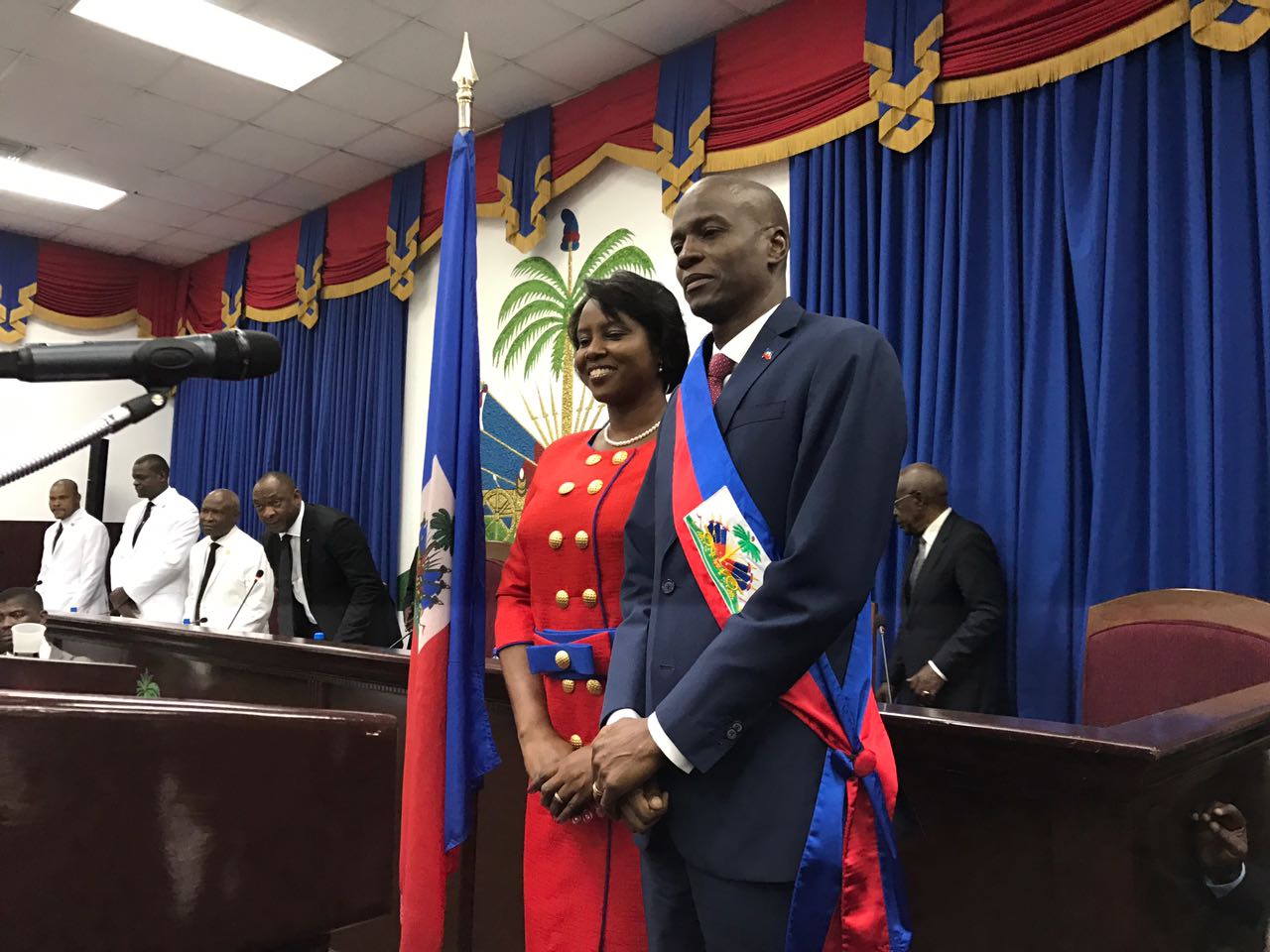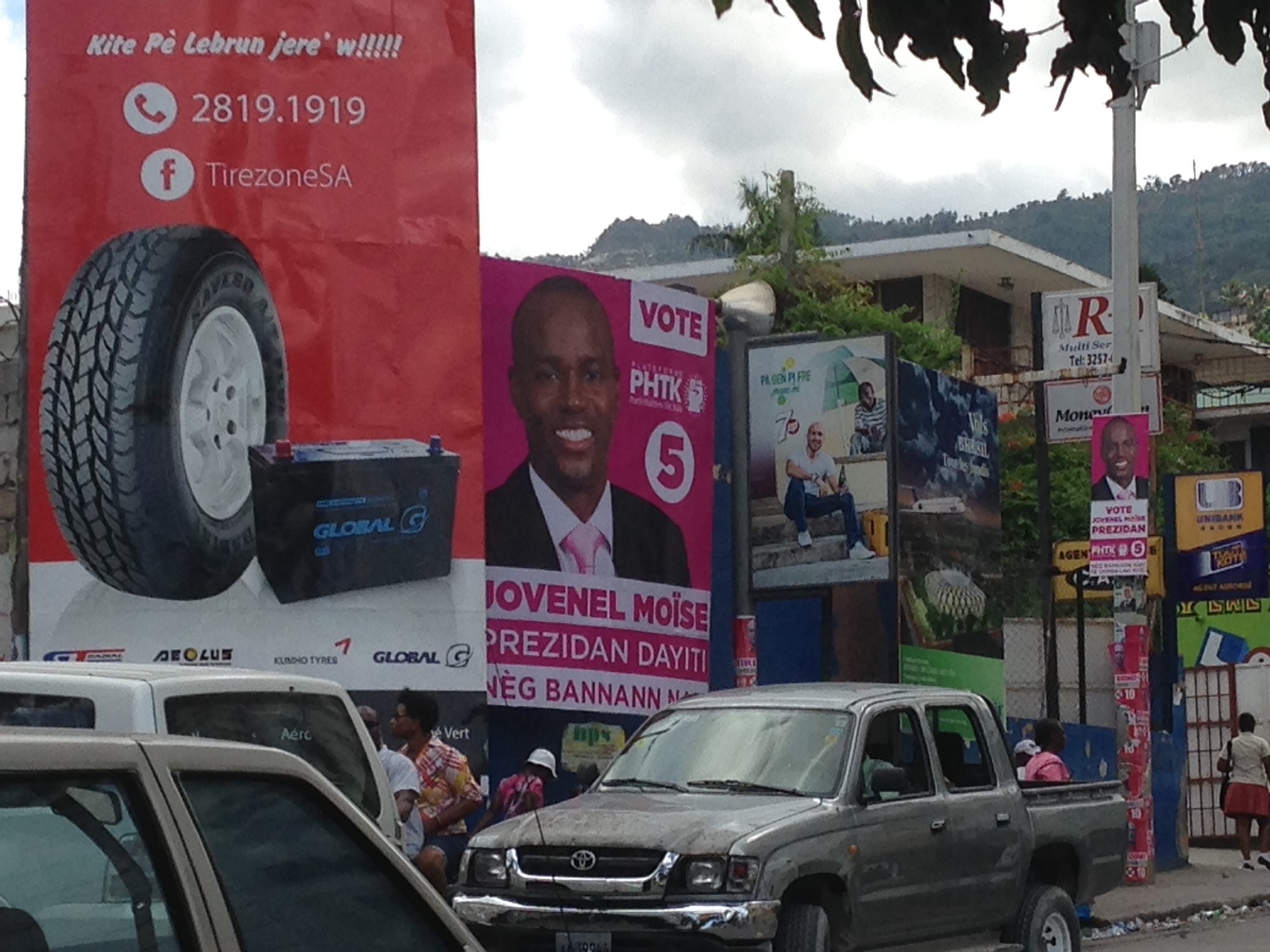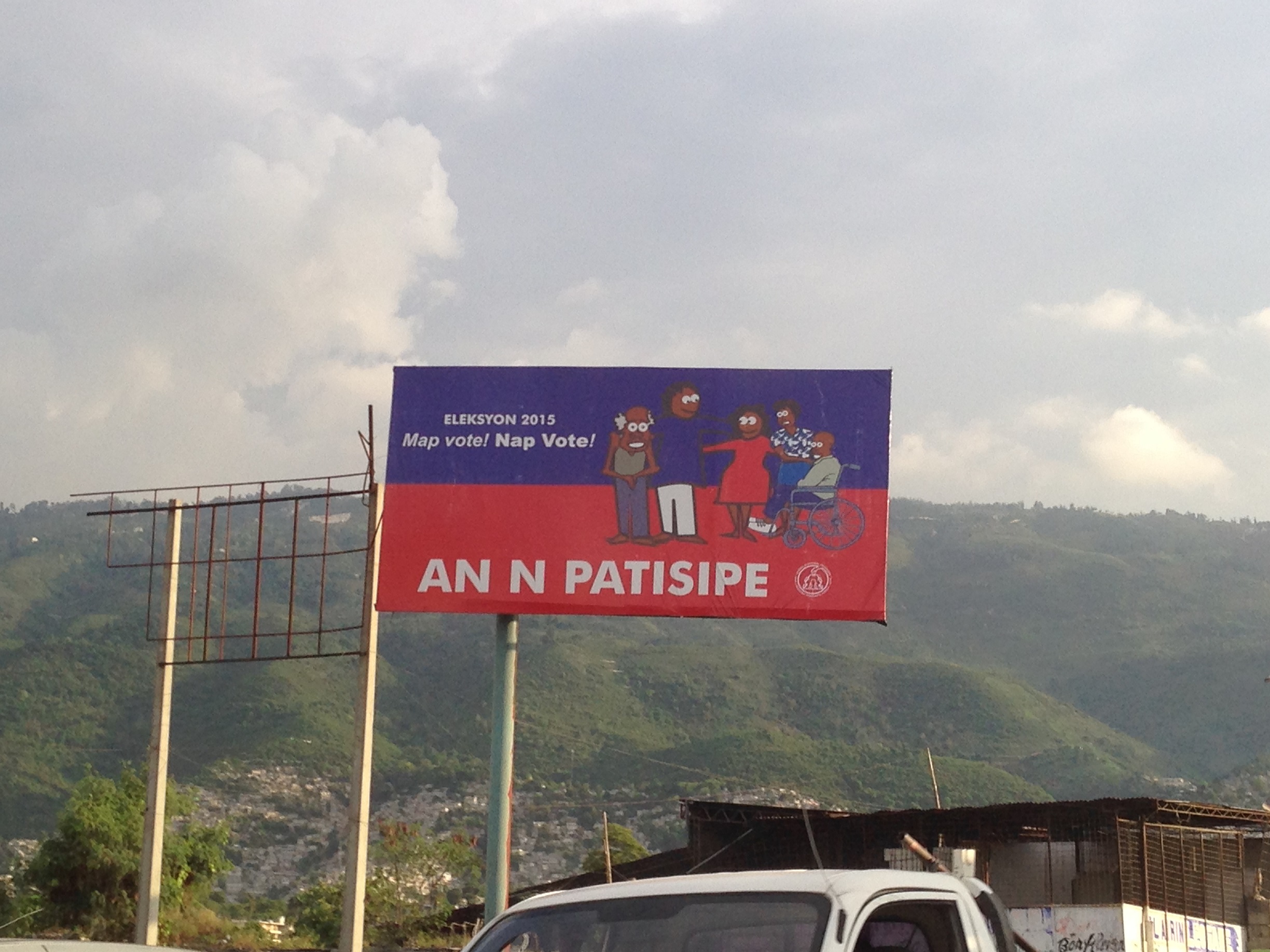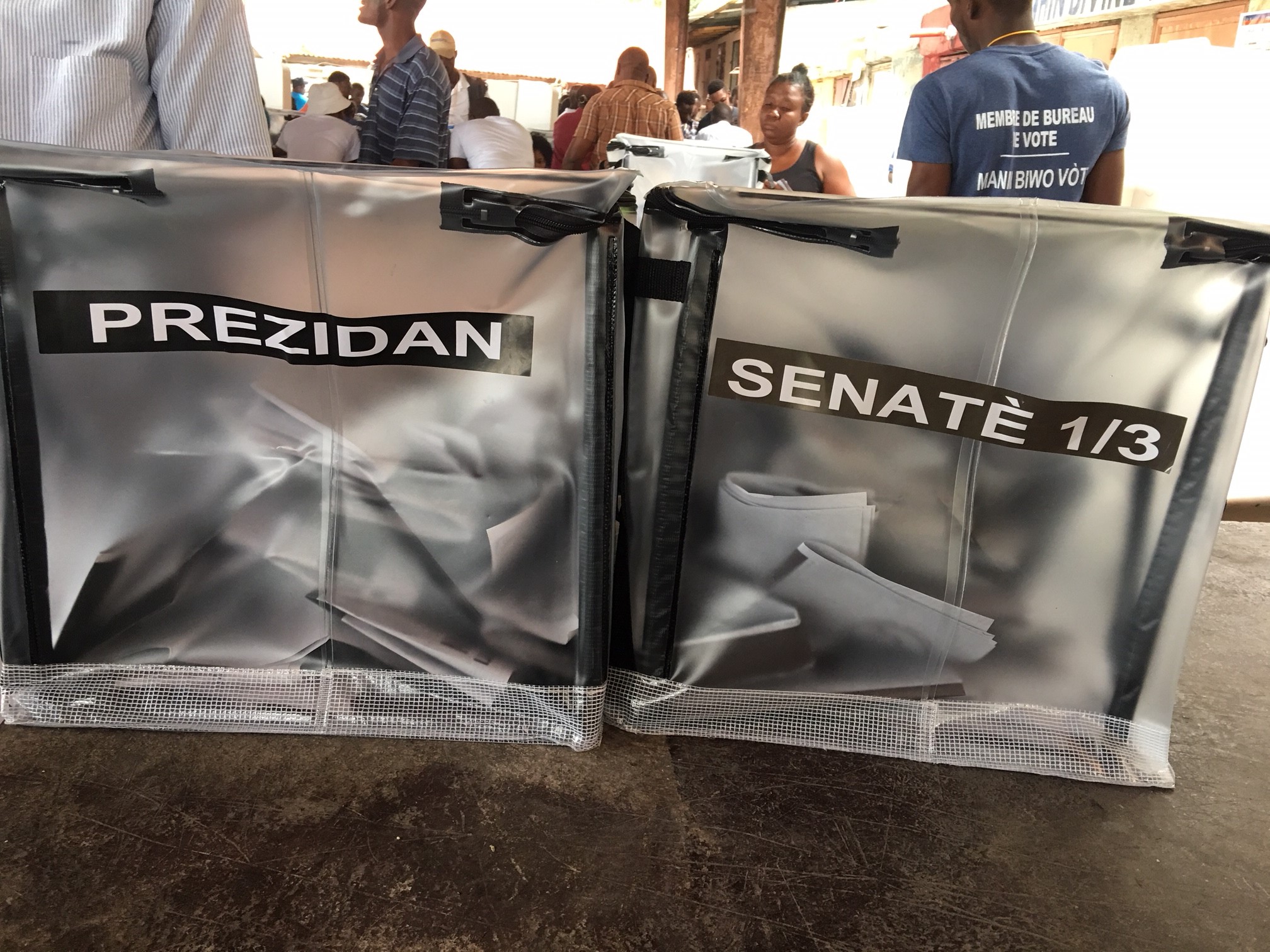News from Haiti Vol. 4: Haiti’s Current Political Situation
Talking about the new political landscape and challenges of the new Administration.

(Inauguration of President Moïse at Port-au-Prince)
February 7th, 2018 marked one year since the current president H.E. Jovenel Moïse took power and ending one-fifth of his term. The presidential term is five years, without the possibility of consecutive re-election. During his first year, President Moïse nominated and appointed the prime minister, created a new cabinet, and embarked on a reform to expand and update Haiti’s agricultural industry. President Moïse has declared this to be a priority during his presidency, and has given the name of this reform the “Caravan de Changement”.
Although this may seem like a fairly simple and regular process, for the Haitian government it is quite the opposite, and President Moïse has been commended for completing this daunting process in a relatively swift period of time without any major mishaps.
A continuing goal to be achieved in Haitian politics and administration has been political stability and civil order. In order to further the development of the nation, it is imperative that there is both economic and social stability; this is directly connected with political stability and public order, and without these essential foundations national development and improvements will not move forward. This puts Haitian political stability and economic stability in a chicken and egg situation, but it is fair to say that both parties are essential and inseparable in regards to the stability and development of Haiti.
◆The Political System
As its name suggests, under its current constitution Haiti has adopted a constitutional republic, with the president as head of state. The President’s maximum term is five years, without the possibility of being elected a consecutive following term.
The Prime Minister is appointed by the president, but necessary to be approved by the Parliament (Upper and Lower House) during his policy speech (His policy speech as well as whole cabinet members (Ministers) should be approved through this parliamentary process).
The legislature is bicameral; the Senate comprises 30 members, and the Chamber of Deputies comprises 119 members. Senate members have a six year term, and one-third of members face re-elections every two years. The Chamber of Deputies, however, has a four year term and no re-elections. There is a separation of power between the judicial, legislative, and executive branches of government, with the Court of Cassation at the vertex of the administration of justice. Haiti faces many challenges in maintaining the functions and structure of its governmental system; it is not simple to keep the system up and running from the perspective of a stable management.
A typical challenge is that of elections, which affects “President” in terms of government, and “Assemblymen” in terms of the legislative bodies. Another question is the approval (and confidence in) of the Prime Minister’s appointment by the President. Additionally, there is also a delay in appointment of judicial officials making it difficult for all facets of the government to come together and work smoothly.
As mentioned before, the appointment of the Prime Minister is simple on paper, as in theory only the approval of the Parliament is needed. In reality, however, it is quite a long and complex process. When the President is creating a new administration, instead of listening to the Parliament as a whole, individual members state their conditions and everyone must come to an agreement before the Prime Minister can be instated. A long process of negotiations is awaiting the Prime Minister from the time he is appointed by the President to the time that the Parliament takes a confidence vote. In recent years, such as under the previous President Michel Martelly, and interim President Jocelerme Privert, their first choice for Prime Minister did not receive the approval it needed from the Parliament, and so a new candidate had to be chosen and start over again the process. These examples explain how the approval of first pick of the President for Prime Minister, Dr Jack Guy Lafontant from the Parliament and set up the cabinet in such a short time period (of 47 days from inauguration of Presidency) was surprisingly quick. This is due in part to revisions made to the constitution in 2012 as well as ruling party PHTK with alliance parties who has made a constant presence in Parliament. If this situation continues, political stability is not far for the Haitian government.
As one can see, political negotiation is an important approach in current Haitian politics, and President Moïse is taking a stringent approach to eradicating what others have called a hotbed of corruption.

(Campaign poster in town with then-candidate Jovenel Moïse)
In order to understand Haiti’s legal system, we must look at the history and influence of many factors, including the time when it was still under French rule over 200 years ago. While under French rule, Haiti’s legal system was that of the French, and it is understandable that they needed to build their own at the time of the dawn of modern law, and should be quite a challenge. In particular, the concepts of “equality” and “human rights” and who these concepts are applied to in the modern era may differ from those in the past, thus problems with the legislation created during the founding of the nation have come to light in recent years.
The first constitution of Haiti was written in 1801 before her independence, sometimes referred to as “Toussaint Louverture’s Constitution” and the start of the Haitian Revolution. It set a new level of standards including the abolishment of the slavery system and giving freedom and rights to nonwhites. After gaining independence, the administration amended the document to reflect changes in society; until the current year it has been revised 23 times. The constitution which was re-instated after the success of the general election of 1987 ending the oppressive father-son dictatorship of the Duvalier family should be a remarkable one. The last amendment as of May 2018 was in 2012, which removed clause 137 requiring that the President’s choice for Prime Minister must be approved by the Parliament. Even now there are committees set up to amend the constitution as seen fit for the future of Haiti.
Haiti’s Civil Law is said to have been largely influenced by 1804 Napoleonic Code, but Haiti took this code and turned it into a system specific to her nation. In the typical modern state, the fundamental basis is the administration of law, with the establishment of a judicial system, public safety, and a national police force all playing important roles in up-keeping the civil law. However, regarding the relationship of the civil law and the legal system, Haiti’s long history of political instability has contributed to a lack of a properly established and practiced civil law, with the challenge of overcoming the mentality of protecting oneself before abiding by the rules. Additionally, the long-dysfunctional Parliament has made it difficult to maintain and modernize national law, and ratify international agreements which Haitian government already signed in the international community. These problems are also being addressed step-by-step by the current administration.

(Campaign Billboard: “Let’s Vote”)
Elections in Haiti are something best to be avoided, as the competition between opposition camps can polarize and stir up conflict and even destroy relationships between peoples and families. One reason for this might be because Haitians are naturally a politically charged people; another reason may be because Haitian lifestyle and elections are full of aspiration and expectation. The certain backers of political candidates only have their eye on the prize, and will work to the extremes to support their candidate. Failure is not an option, for if they lose all is lost is the mentality and shows how serious they are about elections and the outcome. In this case, people so(too) much implicated in the winning the game, and thus the results of the election are often challenged, where the candidate with the less number of votes claims the winner was corrupt and demands a revote.
There have been many instances of candidates claiming fraud and recounts, including the most recent election in 2015 where two major Electoral observers from the EU and the OAS came in and confirmed that there was no election fraud that took place. However, even with both observers’ reports, the opposition parties now feeling the burn even more than before,formed an alliance and held large demonstrations proclaiming the election was invalid. A re-vote was issued on grounds of public safety, but the winner of the 2016 election was the same as the first time, the current President Moïse.
Furthermore, there have been instances where the Senate has transitioned without holding regular re-elections of one-third of the members; the Senate was stopped and non-functioning until all seats were filled. A difficult political environment has been continuing for a while surrounding the execution of elections, and the problem with accepting the results of supposedly fair elections. There is currently a discussion set up specifically to help stabilize and oversee elections within the government and working closely with the CEP (provisional electoral council) in order to transit into the Permanent Electoral Council. And in parallel, will be tasking themselves to elaborate the form modality, system and, process and the budget of future elections in Haiti.
There are other logistically enormous operating problems that cannot be ignored. Costs of elections outweigh others. Costs include executing the election itself, training costs for election officials and the training for the trainers, money needed for ballot paper, distributing and collecting the ballots, and the list continues. There are cases where in places such as the mountains or along the shores, there are no roads leading to the polling stations. The ballots should be delivered to all polling centers at a time and needed to secure them from interferences with the security guards until the Voting day. And as soon as the voting and counting are over, almost immediately transported back again with security guards to the Center to prevent the theft and/or destruction of the ballots.
Needless to say, this also creates a financial burden on the election system.
During the previous presidential election, the United Nations Development Programme (UNDP) helped support the CEP by giving technical help and training to those involved in the election. The United Nations Stabilization Mission in Haiti (MINUSTAH) also assured security escorts and transportation for the distribution and collection of ballots, seemingly to successfully wrap up this huge amount of logistics based election in Haiti.
To be involved in Electoral process, under the given circumstances of anybody could be charged against responsible for fraud, you have to demonstrate its neutrality and transparency with greatest care which only can lead to the success, and I think this was the case.
I was able to participate in this elections as an “observer” and I saw many different polling stations. Upon visiting these stations, they did impress me as being perfect pictures of rigorous and greatest care to their best, and did not reminds me of any fraud. In order to ensure transparency in the election, a representative from every political party (called "mandataire") was present at the polling stations as a observer, and the person in charge of counting the votes opened up the ballot and checked one side where (under the photo of the each candidates) the X was ticked, and on the opposite side to check also names of the 1st and 2nd person in charge of the Polling Station, by showing each time to the party representatives as they counted the votes. Every counting are done by putting a vertical bars like "IIIIII" beside the candidate name on the list, and then counted and written down in Arabic number. Thus, It is imaginable that at some limited places, some kind of fraud and other simple mistakes may occur, but what I have observed was every personnel at the voting center was something very serious and doing correctly. And can say on the whole the management level of elections and polling stations has improved. Moving on, Haitians can expect more actions to improve the logical execution of and management of national elections in the future.

(Ballot box: President Senate)
In Haiti, political stability and the insurance of public safety are important elements. They are not important only as individual elements, but also their relationship with each other is just as significant.
Also further promoting social turbulence are political demonstrations between opposition parties, which lead to violence and further escalate citizens’ discontent with Haiti’s socio-economic condition.
Slums in the urban areas were in many cases inhabited by farmers who no longer had any means of production but not limited to grow to a much larger communities and ; now they are hotbeds of organized crime with gangs that even the Haitian National Police(HNP) fear. Shoot-outs between gangs are common, as turf wars and struggles for power often turn violent and spread outside of the slums. Gangsters are responsible for violent robberies and other crimes, and even go so far as to assassinate those who are “in the way”.
The seemingly politically inseparable problem of public safety has a long history, with the UN Peacekeeping Operations stepping in to help. 2017 marked the end of 13 years of the UN’s MINUSTAH mission to keep civil order and strengthen the Haitian National Police force. Following the withdrawal of MINUSTAH, the UN issued a smaller peacekeeping mission called “United Nations Mission for Justice Support in Haiti”. MINUSTAH worked closely together with the United Nations Development Programme (UNDP) to help stabilize one of the important elements "The election" without any possible disorder.
The largest difference between MINUSTAH and MINUJUSTH is the presence of, or lack of armed UN peacekeeping military forces that have the ability to handle public safety issues.
If the riots to be occurred in Haiti are under sufficient control of the police or it could go beyond is a threshold to determine which needs a backups of more sophisticated forces or not, and currently, it can be perceived that the Haitian Police Force is largely able to manage public disturbances without the help of the UN armed forces, and thus MINUSTAH is no longer needed.
Measures to reduce gang violence in slums, improve police patrols in cities to protect citizens’ public safety, as well as improve the justice side of police cells and detention centers as well as the infrastructure and organization of said centers is being improved step-by-step. Also, improvements are being made to the administrative law and trial procedures; Haiti is also showing advances in strengthening the base of their social and economic fronts to improve her overall standard of public safety for all of her citizens.
◆Political Challenges in the Current Administration
As I have talked about in previous paragraphs, the most important thing for the current Haitian presidency to focus on is to stably manage the unstable national political situation, successfully sustain the current administration, and to successfully hold the next elections. It must also successfully manage any sources for possible disruption of public order, such as losing the support of opposition parties.
Additionally, the improvement of national finances is an important element to obtain loans from international organizations and donor countries. It is hoped that the cost of subsidies Haiti has been giving up until now for its energy (such as gasoline) and power costs will be mitigated to ensure sound budget. Focus will also be on how Haiti can make the move from subsidies without creating a direct cause for social unrest.
The demand for the protection of citizen’s life and the upkeep of basic infrastructure have become pressing needs for the government. The government is looking for ways to improve food security issues and increase exports, and is continuing to take measures to improve Haiti’s popularity with tourists, businesses, and residents.
On the foreign relations front, it is necessary for Haiti to maintain relations with neighboring Caribbean nations, North American nations, and European countries such as France. Haiti must address immigration and smuggling issues; in particular, Haiti must handle the situation with neighboring Dominican Republic regarding problems such as border disputes and the jurisdiction and repatriation of Haitians.
On the other hand, related with the Peacekeeping Operations in place, in order for Haiti to avoid relying on foreign countries’ support and to maintain its autonomy, she is restructuring her army to not for battle but in the transportation, medical, and facility units.
Moreover, Haiti must address its disaster-prevention measures, as it is relentlessly hounded by hurricanes, earthquakes, extremely heavy rains and flooding, and erosion.
Although Haiti has many needs she needs to address, the new government is also taking head-on issues such as strengthening the political system, improving its infrastructure, and re-organizing its relationships with the international community over cooperation issues.
(*All photos taken by the author)
(*This column reflects the personal views of the author and not the opinions of their employer)
Back numbers are here
WHAT'S NEW
- 2024.12.4 UPDATE
PROJECTS
"Barbados A Walk Through History Part 14"
- 2024.9.17 UPDATE
PROJECTS
"Barbados A Walk Through History Part 13"
- 2024.7.30 UPDATE
EVENTS
"408th Lecture Meeting Regarding Global Issues"
- 2024.7.23 UPDATE
PROJECTS
"Barbados A Walk Through History Part 12"
- 2024.7.9 UPDATE
ABOUT
"GREETINGS FROM THE PRESIDENT JULY 2024"
- 2024.7.4 UPDATE
EVENTS
"APIC Supports 2024 Japanese Speech Contest in Jamaica"
- 2024.6.27 UPDATE
EVENTS
"407th Lecture Meeting Regarding Global Issues"
- 2024.5.21 UPDATE
EVENTS
"406th Lecture Meeting Regarding Global Issues"
- 2024.5.14 UPDATE
EVENTS
"405th Lecture Meeting Regarding Global Issues"
- 2024.4.2 UPDATE
PROJECTS
"Water Tanks Donated to Island of Wonei, Chuuk, FSM"




